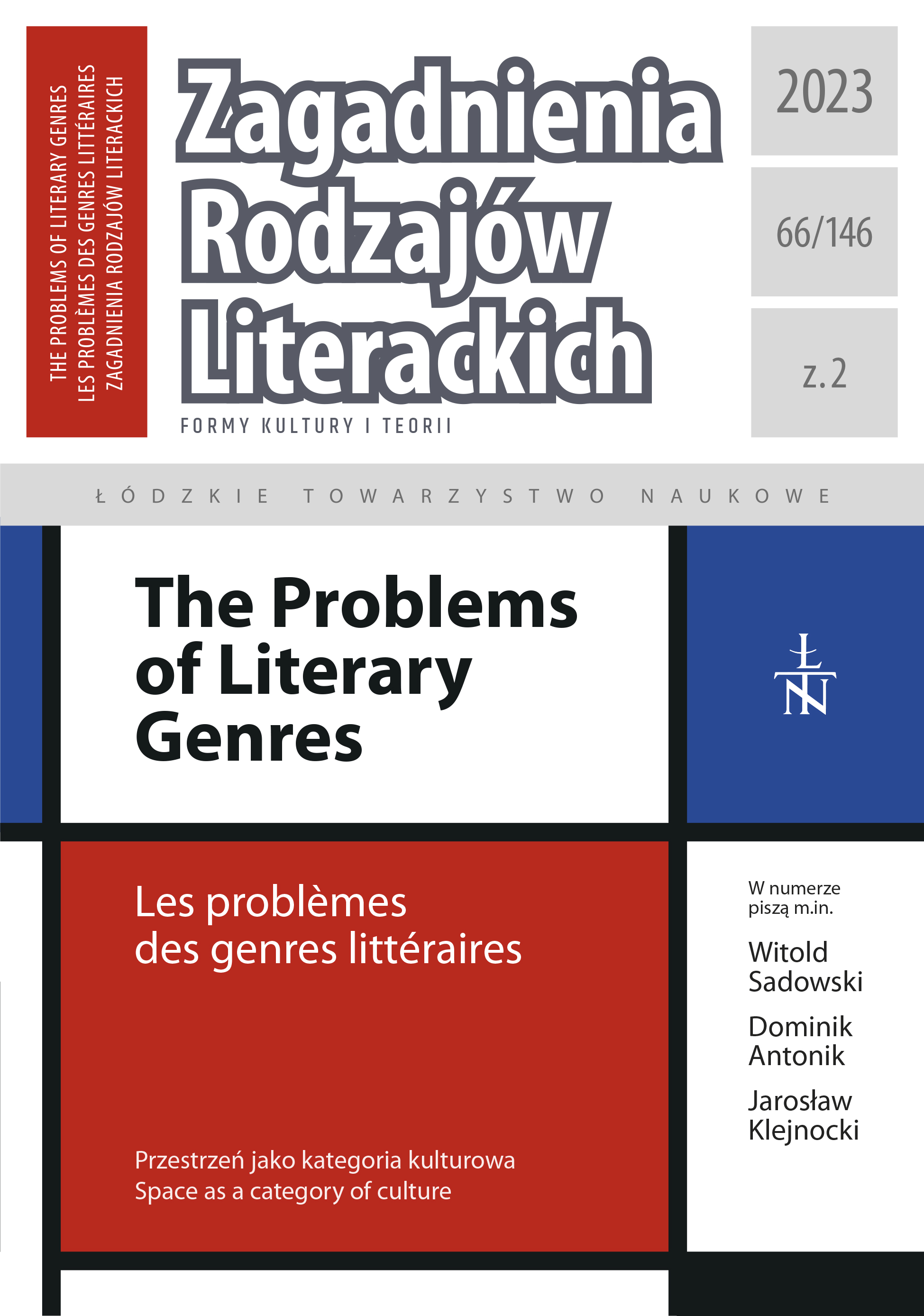Przestrzeń litanii w poezji współczesnej
DOI:
https://doi.org/10.26485/ZRL/2023/66.2/6Słowa kluczowe:
litany; space; genre semantics; generic worldview; contemporary poetryAbstrakt
In recent research special attention has been paid to theocentric space-time as a cosmological principle that explains the enumerative character of the traditional litany. It is, indeed, no accident that the genre gained popularity during the ascendancy of Neoplatonism, according to which geography of the visible world is misleading as all the diversity of earthly and celestial creations somehow springs up from a divine monad. However, a question arises: to what extent the ancient assumptions are still relevant in the 20th- and 21st-century poetic litanies of different countries? This essay argues that in the poems by Juan-Eduardo Cirlot, Richard Eberhart, Frantiešek Halas, Anna Kamieńska, Desanka Maksimović, Charles Peguy, Giovanni Raboni, Aurelia Thiegi, and others, the litanic enumeration almost automatically implies concentric space-time, a fact which sometimes is additionally highlighted by an anaphoric order of spatial pronouns, such as “here,” “where,” “in,” “over” etc. At the same time, however, the name of God is only sporadically mentioned which means that the space’s dependence on the single source of existence is announced through the genre itself rather than through words. Finally, the essay also seeks to explain the surprising stability and durability of the genre semantics. As it is illustrated by the poems of Anna Kamieńska, Audre Lorde, and Kazimierz Wierzyński, when the divine monad is expelled from the central position of a litany’s universe and replaced by a human being, the genre resists — as it were — the attempts at questioning the theocentric concept of its space-time. Since the litanic semantics is expressed by formal rather than verbal means, a poet turns out to have no tools to contradict the content of the genre and the only way to accentuate one’s particular standpoint is to initiate a dialogue between what is said in words and what is said through the genre.
Liczba pobrań
Bibliografia
Bednarek Antoni (2004), Litania poetycka [hasło] [w:] Encyklopedia Katolicka, red. A. Szostek i in., t. 10, Towarzystwo Naukowe Katolickiego Uniwersytetu Lubelskiego, Lublin.
Brandstaetter Roman (2003), Księga modlitw, Wydawnictwo „M”, Krakow.
Chojnowski Zbigniew (1995), Metamorfozy Anny Kamieńskiej, Wyższa Szkoła Pedagogiczna, Olsztyn.
Cirlot Juan-Eduardo (1981), Obra poetica, red. Clara Janes, Ediciones Catedra, Madryt.
Delaporte Jean (1967), Peguy dans son temps et dans le notre, Union generale d’editions, Paryż.
Đorđević Ljubica (1973), Pesničko delo Desanke Maksimović, Filološki Fakultet Beogradskog Univerziteta, Belgrad.
Duchniewski Jerzy, Piech Jacek (2004), Litania [w:] Encyklopedia Katolicka, red. A. Szostek i in., t. 10, Towarzystwo Naukowe Katolickiego Uniwersytetu Lubelskiego, Lublin.
Duploye Pie (1973), La melancolie virgilienne, „Revue d’Histoire litteraire de la France” nr 73(2/3).
Eberhart Richard (1988), Collected Poems 1930–1986, Oxford University Press, Oxford.
Endlicher Michael (b.r.), Ich bin total gesund. (Litanei #8), https://endlicher.at/Ich-bin-total-gesund.html [dostęp: 25.09.2023.]
Euklides (1908), The thirteen books of Euclid’s Elements, przeł. T.L. Heath, Cambridge University Press, Cambridge.
Greig Jonathan (2017), On the Circle-Radii-Center Analogy to Divine Causality in Plotinus, Proclus, and Damascius, and Its Legacy [tekst wykładu wygłoszonego 30 maja 2017 roku dla Forschungsseminar Latinistik na Uniwersytecie Monachijskim], https://osf.io/9bfra/download [dostęp 5.10.2023].
Halas František (1981), Časy, wyd. František X. Halas, Československy pisovatel, Praga.
Halas František (1982), Imagena, wyb. J. Waczkow, Państwowy Instytut Wydawniczy, Warszawa.
Janes Clara (1981), Introduccion [w:] J.-E. Cirlot, Obra poetica, red. Clara Janes, Ediciones Catedra, Madryt, s. 11–42.
Kamieńska Anna (2020), Poezje zebrane, red. W. Kruszewski, t. 2, Muzeum Lubelskie, Lublin.
Lorde Audre (1997), The Collected Poems, Norton, Londyn.
Maksimović Desanka (2012a), Celokupna dela, oprac. S. Tutnjević, Zadužbina Desanka Maksimović, t. 2, Belgrad.
Maksimović Desanka (2012b), Celokupna dela, oprac. Ž. Živković, B. Đorđević, Zadužbina Desanka Maksimović, t. 3, Belgrad.
Michaux Henri (1998), OEuvres completes, wyd. Raymond Bellour, Yse Tran, Gallimard, Paryż.
Morgan Nigel J. (2012), English Monastic Litanies of the Saints after 1100, t. 1, Henry Bradshaw Society, Londyn.
Peguy Charles (1948), OEuvres poetiques completes, oprac. M. Peguy, Gallimard, Paryż.
Pešat Zdeněk (1967), Načrt monograficke kapitoly 4. dilu Dějin česke literatury, „Česka literatura” nr 15(1).
Plotyn (1959), Enneady, przeł. Adam Krokiewicz, t. 2, Państwowe Wydawnictwo Naukowe, Warszawa.
Raboni Giovanni (2014), Tutte le poesie 1949–2004, oprac. R. Zucco, Giulio Enaudi, t. 2, Torino.
Radziszewski Stefan (2011), Kamieńska ostiumiczna, Jedność, Kielce.
Sadowski Witold (2004), Wiersz wolny jako tekst graficzny, TAiWPN Universitas, Krakow.
Sadowski Witold (2011), Litania i poezja. Na materiale literatury polskiej od XI do XXI wieku, Wydawnictwa Uniwersytetu Warszawskiego, Warszawa.
Sadowski Witold (2016), Wiersz litanijny w przekładzie na obraz [w:] Ikonoklazm i ikonofilia: Między historią a wspołczesnością, red. A. Stankowska, M. Telicki, Wydawnictwo Poznańskiego Towarzystwa Przyjacioł Nauk, Poznań.
Sadowski Witold (2018), Europejski wiersz litanijny. W innej czasoprzestrzeni, Wydawnictwa Uniwersytetu Warszawskiego, Warszawa.
Sadowski Witold (2021), Gatunkowe obrazy świata: sielanka, litania, sonet, „Pamiętnik Literacki” nr 112(2).
Shuttle Penelope (2012), Unsent. New & Selected Poems 1980–2012, Bloodaxe Books, Glasgow.
Skwarczyńska Stefania (1985), Topos „Ubi sunt qui ante nos fuerant?” oraz styczne z nim formacje treściowo-formalne w poezji europejskiego kręgu kulturowego [w:] S. Skwarczyńska, W orbicie literatury, teatru, kultury naukowej, Instytut Wydawniczy PAX, Warszawa.
Sochoń Jan (2022), Nie pocieszaj się, tylko płacz, Państwowy Instytut Wydawniczy, Warszawa.
Szostek Andrzej (red.) (2004), Encyklopedia Katolicka, t. 10, Towarzystwo Naukowe Katolickiego Uniwersytetu Lubelskiego, Lublin.
Tieghi Aurelia (b.r.), Poesie di Aurelia Tieghi, www.poetare.it/tieghi.html [dostęp: 8.10.2023].
Twardowski Jan (2007), Zaufałem drodze. Wiersze zebrane 1932–2006, zeb. A. Iwanowska, Oficyna Wydawnicza ASPRA-JR, Warszawa.
Villon Francois (1968), Wielki testament, przeł. T. Żeleński (Boy) [w:] Arcydzieła francuskiego średniowiecza, wyb. M. Żurowski, Państwowy Instytut Wydawniczy, Warszawa.
Villon Francois (1974), Le Testament, red. J. Rychner, A. Henry, Librairie Droz, Genewa.
Wierzyński Kazimierz (1990), Poezje, opr. E. Cichla-Czarniawska, Wydawnictwo Lubelskie, Lublin.
Pobrania
Opublikowane
Jak cytować
Numer
Dział
Licencja
Prawa autorskie (c) 2023 Łódzkie Towarzystwo Naukowe i autorzy

Utwór dostępny jest na licencji Creative Commons Uznanie autorstwa – Użycie niekomercyjne – Bez utworów zależnych 4.0 Międzynarodowe.







